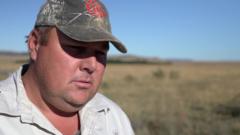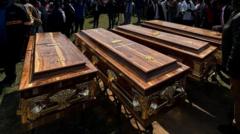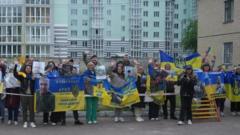The P39-1 road in KwaZulu-Natal, marked by a temporary memorial for victims of farm violence, has attracted global attention following President Trump's claims of a 'burial site.' Local residents and community leaders clarify the misleading narrative, sharing their experiences and hope for unity amidst a history of racial tension.
Trump's Misleading Claims about South African Road Sparks Community Outrage

Trump's Misleading Claims about South African Road Sparks Community Outrage
A rural stretch of highway in South Africa mistakenly portrayed as a burial site by President Trump ignites discussions on race and violence.
On the P39-1 highway, connecting Newcastle to Normandein in South Africa, President Donald Trump's recent claims regarding a 'burial site' have evoked profound reactions from the local community. In a video presented during his meeting with South African President Cyril Ramaphosa, Trump cited this anonymous stretch of road as a location marking the supposed persecution of white Afrikaners, linking it to his assertion of a "genocide" that has not been substantiated.
The road, depicted in aerial shots featuring thousands of white crosses, is actually a temporary memorial established after the tragic murders of Roland Collyer's aunt and uncle in 2020. This controversy has illuminated not only the local history but also the tension surrounding race relations in South Africa. Residents of the area have pointed out that the crosses are no longer visible; most have since disappeared, making way for new developments such as a grain mill.
Collyer explains that the crosses represented not a burial site but a symbol of mourning for lives lost to violent crime on farms. Their initial installation was driven by community outrage at the brutal murder of Glen and Vida Rafferty, a farming couple who were brutally killed, highlighting the volatility that persists in South African townships amid rising crime rates.
While Trump's portrayal of the situation carries political implications and sensationalism, it starkly contrasts with the feelings of local residents. Rob Hoatson, a local businessman involved in organizing the memorial, expressed disappointment at Trump's exaggeration, emphasizing that it was a momentary act to draw attention to the issue rather than a permanent acknowledgment of a burial site.
Local residents, like Collyer and others, continue to work and live in the area, some expressing fears regarding their safety due to the country's high murder rates. However, even amidst challenges, Collyer stated he is committed to remaining in South Africa to honor the legacy of his family.
Overall, the misrepresentation of this memorial has shed light on the complexities of South African society, revealing deep feelings shared amongst residents across racial divides. Despite their tumultuous history, community members like Bethuel Mabaso and Mbongiseni Shibe emphasize the need for coexistence and understanding, aiming to work together for a more peaceful future.
As Trump’s controversies surrounding South Africa continue, the community in Normandein stands resilient, hoping to define their narrative beyond the political theater. "We have the capacity to unite and make this country succeed," Collyer optimistically states, echoing a sentiment seen far and wide as neighborhoods attempt to move forward together.





















